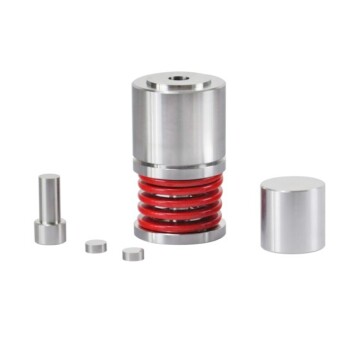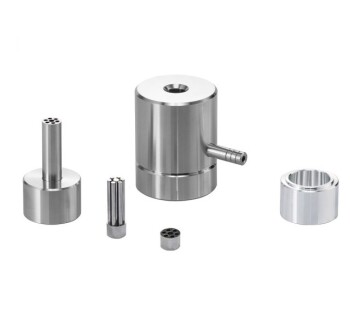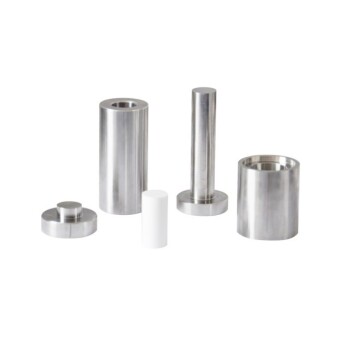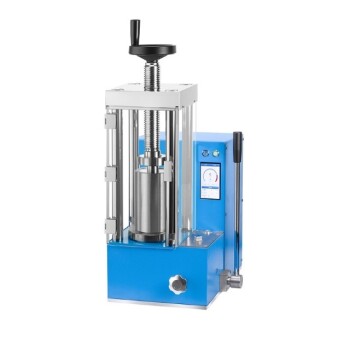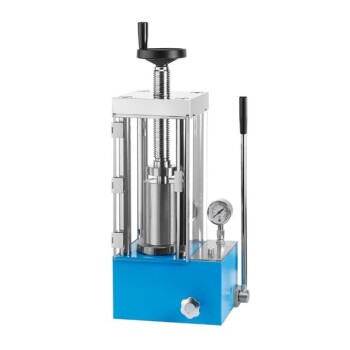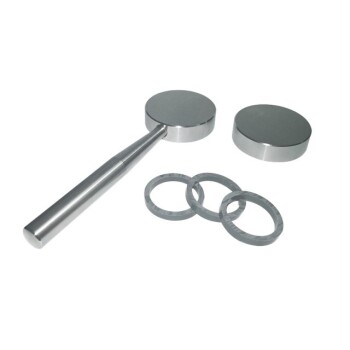In pharmaceutical applications, a laboratory press is a foundational tool used to compress powders and granules into precisely dimensioned tablets. This capability is critical for research and development (R&D), quality control testing, and small-scale production, allowing scientists to test formulations and prepare samples for detailed analytical characterization.
The true value of a laboratory press in pharmaceuticals extends beyond simply making test pills. It is an indispensable instrument for material characterization and process development, providing the critical data needed to ensure a drug formulation is not only effective but also consistently manufacturable at scale.

The Core Function: From Powder to Solid Form
The primary role of a lab press is to apply controlled force to a material within a die set. In pharmaceuticals, this simple action is the basis for several critical development stages.
Tablet Formulation and Development
During R&D, scientists must test numerous formulations. A lab press allows them to create small batches of tablets using different active pharmaceutical ingredients (APIs), binders, and excipients to evaluate their properties.
This process helps determine how a powder blend will behave under pressure, a property known as compressibility.
Simulating Production Conditions
Lab presses, especially instrumented models, help predict how a powder formulation will perform in large, high-speed rotary presses used in full-scale manufacturing.
By measuring compression forces and tablet ejection forces, researchers can identify potential problems like sticking or capping before they become costly production issues. This de-risks the crucial transition from lab to production.
Mechanical Strength Testing
Once a tablet is formed, it must be tested. The press is the first step in a workflow that includes testing the tablet's hardness, thickness, and friability (its tendency to chip or break).
These tests ensure the final product can withstand the stresses of packaging, shipping, and handling.
Beyond Tablets: Sample Preparation for Analysis
While tablet formation is a key use, lab presses are equally vital for preparing samples for the sophisticated analytical instruments that ensure a drug's quality and identity.
Preparing Samples for Infrared (IR) Spectroscopy
A common technique involves mixing a minute amount of a drug sample with potassium bromide (KBr) powder. This mixture is then compressed in a lab press to form a thin, transparent pellet.
This KBr pellet is ideal for analysis with an FT-IR spectrometer, which helps identify the chemical structure and purity of the compound.
Creating Specimens for X-Ray Fluorescence (XRF)
For elemental analysis, such as checking for heavy metal contaminants, a lab press is used to form a powder sample into a smooth, dense briquette.
This uniform sample surface is essential for obtaining accurate and repeatable results from an XRF spectrometer.
Developing Polymer-Based Systems
With heated platens, a lab press can melt and form polymers mixed with an API. This is used to develop novel drug delivery systems like transdermal patches or controlled-release polymer implants.
Understanding the Trade-offs and Limitations
While versatile, a laboratory press is not a perfect replica of a full-scale production environment. Understanding its limitations is key to interpreting results correctly.
The Challenge of Scale-Up
A lab press typically uses a single set of tooling and applies force in a static or slow manner. This differs significantly from a rotary tablet press, which operates at high speeds with multiple stations.
Results from a lab press are highly indicative but do not guarantee identical performance during high-volume manufacturing. Additional pilot-scale studies are always necessary.
The Critical Role of Tooling
The precision of the final tablet or pellet is entirely dependent on the quality of the die and punch set. Worn, damaged, or poorly manufactured tooling will lead to inconsistent results and invalid data.
Manual vs. Automated Presses
A simple manual press is excellent for basic sample preparation like KBr pellets. However, for process development, an automated or instrumented press is superior.
These advanced systems provide precise, repeatable control over compression force and speed, while also logging data that is essential for validating a manufacturing process under Good Manufacturing Practices (GMP).
Aligning the Press with Your Pharmaceutical Goal
Choosing and using a press effectively depends entirely on the specific objective of your work.
- If your primary focus is early-stage R&D: A simple manual press is often sufficient for basic formulation screening and creating KBr pellets for chemical identification.
- If your primary focus is process development and scale-up: An instrumented, automated press that logs compression and ejection force data is essential to predict manufacturing behavior.
- If your primary focus is Quality Control (QC): You need a highly reproducible press to create consistent samples for spectroscopic or physical testing as part of a validated analytical method.
Ultimately, the laboratory press serves as a foundational tool for translating a chemical compound into a safe, effective, and manufacturable medicinal product.
Summary Table:
| Application | Key Use | Benefits |
|---|---|---|
| Tablet Formulation | Compress APIs and excipients | Tests compressibility and formulation properties |
| Process Simulation | Predicts manufacturing behavior | Reduces scale-up risks and identifies issues early |
| Sample Preparation | Creates pellets for IR/XRF analysis | Ensures accurate analytical results for purity and contaminants |
| Mechanical Testing | Evaluates tablet hardness and friability | Confirms product durability for handling and shipping |
| Polymer Systems | Develops drug delivery systems with heated presses | Enables controlled-release implants and transdermal patches |
Enhance your pharmaceutical R&D and quality control with KINTEK's precision lab presses! Whether you're developing new formulations, preparing samples for analysis, or scaling up production, our automatic lab presses, isostatic presses, and heated lab presses deliver reliable, consistent results to meet your laboratory needs. Contact us today to discuss how our solutions can optimize your processes and ensure compliance with GMP standards!
Visual Guide

Related Products
- Automatic Lab Cold Isostatic Pressing CIP Machine
- Lab Round Bidirectional Press Mold
- Laboratory Hydraulic Press 2T Lab Pellet Press for KBR FTIR
- Automatic Laboratory Hydraulic Press Lab Pellet Press Machine
- Special Shape Lab Press Mold for Laboratory Applications
People Also Ask
- Why is a Cold Isostatic Press (CIP) required for Al2O3-Y2O3 ceramics? Achieve Superior Structural Integrity
- What is the core role of a Cold Isostatic Press (CIP) in H2Pc thin films? Achieve Superior Film Densification
- What role does a cold isostatic press play in BaCexTi1-xO3 ceramics? Ensure Uniform Density & Structural Integrity
- What are the typical operating conditions for Cold Isostatic Pressing (CIP)? Master High-Density Material Compaction
- What are the design advantages of cold isostatic pressing compared to uniaxial die compaction? Unlock Complex Geometries

